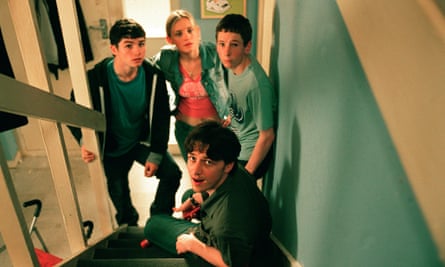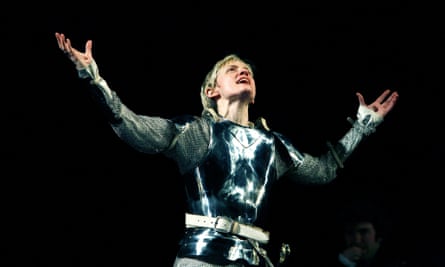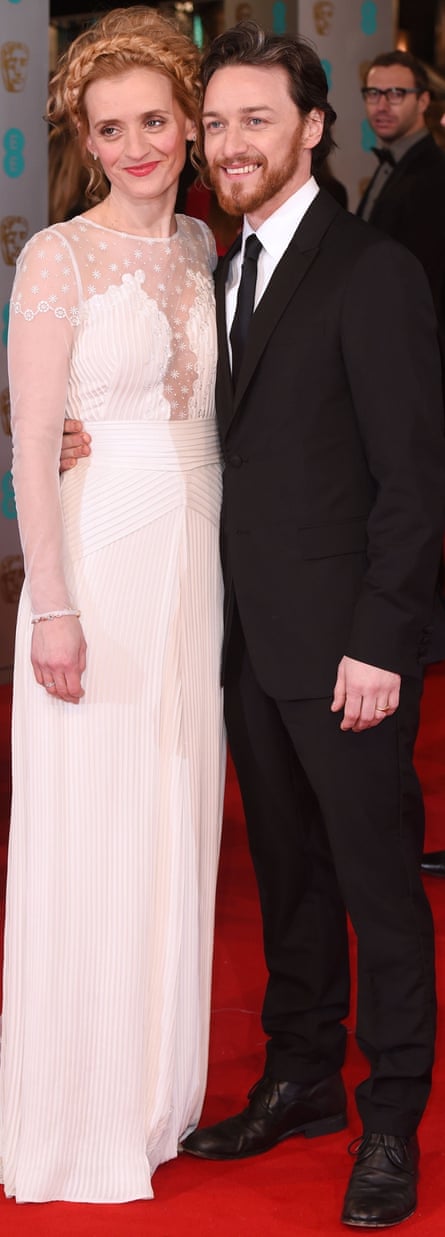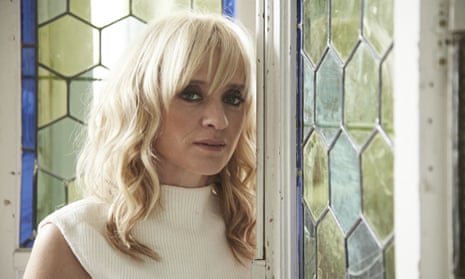Is Anne-Marie Duff walking out on our interview? Technically she has already put on her coat. She was leaving anyway… right? But no… hang on. Yep, she’s definitely storming out. “Well, thanks very much,” she says. “You’ve made me feel like shit.”
And with that she starts running down the stairs. The front door bangs. Gone. What an exit.
I sit and stare for a while. After few moments her publicist returns from her trip to fetch Duff some lunch. (I am in the sparse attic of a location house – an ex-pub – where Duff had completed a photo shoot that morning.) “Hello?” she calls up the stairwell. “Are you OK? Jesus, what happened?”
It’s a very good question. I’m slightly baffled. I have an inkling things started to go wrong from the beginning. I had begun our interview with what I thought could be some fun small talk: the fact that Duff was from my hometown of Hayes in west London. Although we weren’t there together, Duff also went to my high school. Initially Duff was enthusiastic. “Put it there, lady!” she had figuratively high-fived me. “I have never met anybody who went to my school since I left happy Hayes,” she said, rolling her eyes, smiling. But further questions (Does she ever go back to Hayes? Are her parents still there?) were met with caution, even suspicion. Asking about the council estate she lived on is a step too far. “This isn’t me and you having a cup of tea,” she will later snap. “This is an interview. This isn’t us connecting.”
In person, Duff looked softer than I imagined: more glowy, less pallid than some of the characters she has so memorably played on stage and screen. For the photo shoot the publicist said it had been nice to do “something glamorous”; the thing about the new projects was that they were so dark. So far, by way of promotion, Duff had participated in a poster shoot for her new play at the National Theatre, Husbands & Sons – an adaptation of three different DH Lawrence novels set in a mining town. On that poster, eyes starkly staring out, she is completely covered in soot. Her latest movie, Suffragette, is a weighty film about the women’s rights movement in which she plays an exhausted mother and factory worker who helps to lead a surge of violent attacks on the government. And her latest TV drama for the BBC, From Darkness, is no brighter. Duff plays an ex-copper who she says is repressed: “She’s burying things deep down but, of course, they come scratching back at the window, like Wuthering Heights.”
The fact that the parts aren’t wrapped up in pretty bows is nothing new: Duff’s breakthrough came playing the rough-and-ready Fiona in C4’s Shameless. Her interpretation of Joan of Arc as an androgynous Irish girl (Duff’s vision) in Saint Joan at the National Theatre in 2007 made her the critics’ darling, someone who could explore even the shadowiest corners of a character; a heavyweight actor who could turn her hand to anything.
Except, perhaps, an interview. Duff is now fixing me with a fierce glare. Straightforward questions about her work don’t settle her: when I refer to a quote she gave in a news piece about her character in From Darkness – a “strong woman” – she tells me briskly she “hates… that expression” and shuts me down. Asking about her other work proves just as tricky. Talking about Suffragette, she says she feels “despondent” for modern women – “what’s going on internationally, especially” – but resists explaining what she means.
Our chat quickly descends into loaded stares and passive-aggressive silences. while Talking about growing up in the 80s, she says the impact of Thatcherism on our school was that kids “weren’t encouraged to do things which were intangible”. I ask her to elaborate and she audibly sighs: “This is stuff that everybody knows.” At one point we discuss class. I say it’s interesting that some actors seem to carry their class around on their backs forever, while others shed that image – Duff strikes me as the former. “Yes, people want to talk to me about that all the time, curiously,” she says with a hint of sarcasm. Why does she think that is? “Sometimes I think it’s because I don’t blather on about my private life.”

I sympathise that she must get the same things asked of her a lot, but she looks irked. “Well, I guess so but, like I say, interviews are a curious thing. You meet a stranger and you have to talk a lot to each other. What an odd thing to do!” She gives a hollow laugh. A distrust of the press might explain why she is so defensive: quite often she will dismiss a question, only to later decide it’s valid. “I mean, funnily enough it is a conversation now,” she says of the working-class observation, “because we live in this weird old time in which… what’s happened to aspiration? So now I would see a point in talking about that.”
Where she does appear charmed, it’s when talking about what acting means to her. We discuss working at the National: “All actors love the National,” she says, wistfully. “I think there must be something about being beside that great vein of a river…” She explains her acting process – how her inspiration for a character can be something “as lateral as a smell, a flower, a piece of music” – with verve. “It’s just a huge amount of… foreplay,” she exhales.
Duff was the youngest child of Irish immigrants who met in England, her father a painter and decorator and her mother a shoe-shop assistant. Growing up, she remembers not quite fitting in. School, she says, was “a place where I knew I shouldn’t park my car. It was like a waiting room… a period of life to get through.” A shy youngster (“I wasn’t a tap-dancing five-year-old”), in her mid-teens she became set on acting. “And I was just so bloody-minded. It must sound ridiculous to anyone else, but I think, if you are creative things become necessary to you.” She remembers classmates thinking she was “a freak for reading [Soviet writer Maxim] Gorky”. But she doesn’t think she was wholly unpopular – and the elder sister of a schoolfriend of mine would concur. “I just remember her being a really nice girl,” she tells me. “Remember the girls who would smoke in the toilets who were a bit scary and would threaten to flush your head down the loo? Well, she was the opposite of that. So I was shocked when I saw her in Shameless. Yeah, alright, I knew she acted, but you just wouldn’t have thought she had it in her!”

In fact, everybody I speak to has only nice things to say about her. Marianne Elliott, who directed her in Saint Joan and now Husbands & Sons, says: “Remarkably, she has very little ego. She’s so conscientious that sometimes it’s like working with a youngster straight out of drama school.” Sarah Gavron, director of Suffragette, adds: “She’s pragmatic, and a real laugh.”
But still, we struggle to hit it off and eventually our interview reaches its nadir – I make the major error of asking which shoe shop her mother worked in, and this is where Duff delivers the line about us not “connecting”. I try to return to safe territory and ask her if she would like to direct or write one day, but all she can do is stare at the floor blankly.
“Anne-Marie, I don’t feel like this is going very well,” I say.
“Oh, please, don’t make it seem like we’re having a terrible interview, darling,” she says.
I explain I’m just feeling thrown and she suddenly looks thunderous. “Are you trying to make this interview go badly?” she asks. “So you can have a story?”
No, I protest. She seems satisfied. “OK, mate, good.”

After we’ve settled that, the interview goes more smoothly. Up until now we haven’t discussed her marriage to the actor James McAvoy – it is well-known that the couple have a pact to keep this side of things entirely private – but to my surprise she starts to segue into anecdotes about him. Playing Lady Macbeth on Broadway in 2013 leads us neatly into McAvoy’s own production of Macbeth in London the same year and why Duff rates him as an actor: “He was just unrecognisable to me in Filth.” In response to a question about what she’d like to do next in terms of acting projects she brings him into the equation voluntarily: “Oh, I don’t mind really [about which scripts she’s offered next]. Because it’s like falling in love: you have an idea and come up with a list, and then somebody comes along who’s Glaswegian and nine years younger than you, and you go: ‘Whaaaa! I just fell in love with someone!’” Duff laughs. “That’s the just way it is.”
We talk more about Husbands & Sons, which Duff is excited about because it will take place in the round and see the audience switching seats halfway through. “It feels a bit special,” she says. “Jesus, God, I’m so excited about it I can’t tell you.” We talk about why she won’t read reviews (“Because it’s like reading someone’s diary – you won’t stop until you find something negative. Ah, we are a weird, fucked-up species…”) and about reading Judi Dench’s autobiography: “She said she’d been working on a play and everyone came backstage and said it was fabulous and she was like: ‘Really?’ And it made me laugh, because as an actor you can feel that – you don’t always have a connection to what you’re doing.”
If Dench is an idol, I think to myself, then if only Duff could take a leaf out of Dench’s book when it comes to giving interviews. Because Dench gets it where Duff doesn’t: When we finish and Duff puts her coat on, she turns to me and extends her hand. “So, mate,” she says, “are we friends? I’m sorry if you thought I was trying to be resistant.” “Oh no, no!” I say, in the way that British people apologise to each other. I shake her hand. “I just had to tell you I felt uncomfortable, because I did.” And that’s what does it. She’s thunderous again. “Well, thanks very much. You’ve made me feel like shit.”
Let’s hope we don’t run into each other at a school reunion.
Suffragette is released on 12 October. Husbands & Sons previews from 19 October (nationaltheatre.org.uk)

Comments (…)
Sign in or create your Guardian account to join the discussion